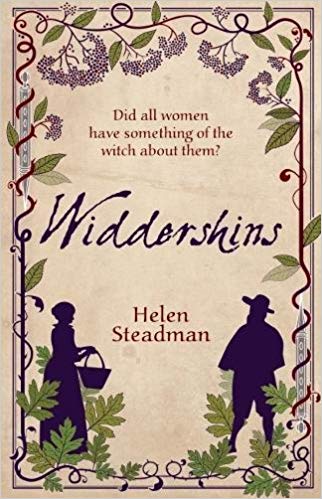
TITLE: Widdershins
AUTHOR: Helen Steadman
PUBLISHER: Impress Books, 2017
ISBN: 1911293044
PODCAST EPISODE: None
REVIEWER: Mark Norman
“Did all women have something of the witch about them?”
“Widdershins”, Helen Steadman’s first novel is in every way a book of contrasts.
The story follows two main protagonists. Jane Chandler is an apprentice healer. John Sharpe is the god-fearing man who rises to become a witch finder. We follow their two stories from youth through to adulthood, with each character being the subject of alternating chapters. Inevitably, as you would expect in a book constructed in this way, the stories of the two intersect in the closing portion of the book.
Sympathy and empathy are words which describe one’s feelings through significant sections of Jane’s story. At the outset of the novel too, sympathy is felt for John also. But this soon gives way to contrasting feelings which escalate rapidly towards hatred by the second half of the book. It is sensible of the author to construct the narrative in the way that she does, as it prevents the reader casting the book aside in revulsion as John’s character develops. Jane’s story, tough though it often is, provides welcome respite.
There is much to engage with in this book aside from the characters, although they draw you in easily enough (even John). There is much of folklore interest here as many herbal recipes, traditional treatments and wayside practices are incorporated into the story in good detail. Maybe at times the exposition feels a little heavy in these sections, but the information is welcome and extremely interesting. It is clear that the author has put a lot of time and effort into her research, and it shows within the narrative.
“Widdershins” is based in part of actual historical events, and in particular on one set of Newcastle witch trials and executions. The author works with the historical detail to imagine the lives of some of the original characters about which little is known. Its treatment of this is respectful and a brief Afterword explains the basics of the original case as well as highlighting the names of the accused and executed.
The book fictionalises a period of our history about which there is little to be proud but about which it is important that we remember. It highlights the plight of the poor, the persecution of the women (and men) who just sought to help others and those who were often just innocent bystanders in the lives of others. It is not an easy read at times, but it is a good one.
AUTHOR: Helen Steadman
PUBLISHER: Impress Books, 2017
ISBN: 1911293044
PODCAST EPISODE: None
REVIEWER: Mark Norman
“Did all women have something of the witch about them?”
“Widdershins”, Helen Steadman’s first novel is in every way a book of contrasts.
The story follows two main protagonists. Jane Chandler is an apprentice healer. John Sharpe is the god-fearing man who rises to become a witch finder. We follow their two stories from youth through to adulthood, with each character being the subject of alternating chapters. Inevitably, as you would expect in a book constructed in this way, the stories of the two intersect in the closing portion of the book.
Sympathy and empathy are words which describe one’s feelings through significant sections of Jane’s story. At the outset of the novel too, sympathy is felt for John also. But this soon gives way to contrasting feelings which escalate rapidly towards hatred by the second half of the book. It is sensible of the author to construct the narrative in the way that she does, as it prevents the reader casting the book aside in revulsion as John’s character develops. Jane’s story, tough though it often is, provides welcome respite.
There is much to engage with in this book aside from the characters, although they draw you in easily enough (even John). There is much of folklore interest here as many herbal recipes, traditional treatments and wayside practices are incorporated into the story in good detail. Maybe at times the exposition feels a little heavy in these sections, but the information is welcome and extremely interesting. It is clear that the author has put a lot of time and effort into her research, and it shows within the narrative.
“Widdershins” is based in part of actual historical events, and in particular on one set of Newcastle witch trials and executions. The author works with the historical detail to imagine the lives of some of the original characters about which little is known. Its treatment of this is respectful and a brief Afterword explains the basics of the original case as well as highlighting the names of the accused and executed.
The book fictionalises a period of our history about which there is little to be proud but about which it is important that we remember. It highlights the plight of the poor, the persecution of the women (and men) who just sought to help others and those who were often just innocent bystanders in the lives of others. It is not an easy read at times, but it is a good one.